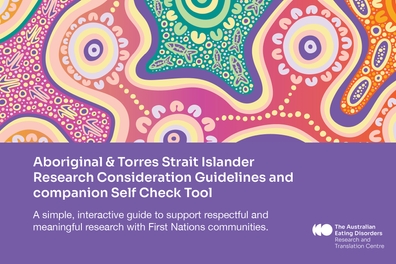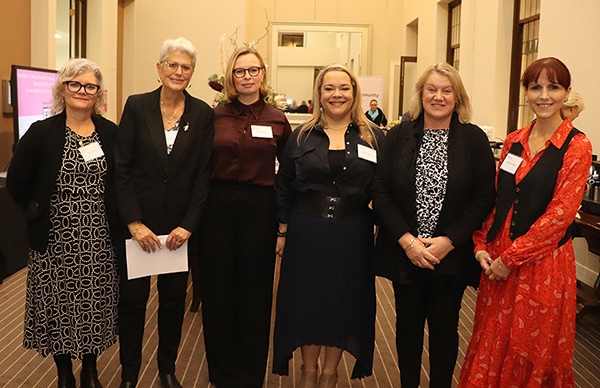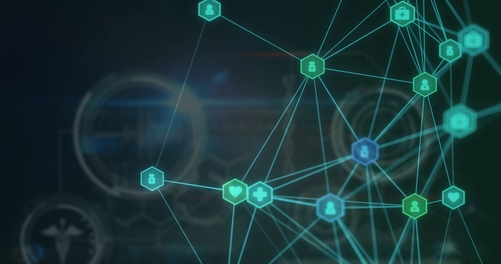
Watch the recording of the launch of the Aboriginal and Torres Strait Islander Researcher Self Check Tool and the announcement of a $2.8 million national First Nations-led research initiative.
19 June 2024
The AEDRTC’s core vision - collaboration between like-minded researchers, clinicians and people with lived experience to change the way eating disorders research is conducted in Australia - was central to everything from the groundbreaking presentations to the conversations that flowed well into the evening at Think Tank 2024
Victorian Minister for Mental Health the Hon. Ingrid Stitt MP officially opened the two-day event in Melbourne. AEDRTC’s Aboriginal and Torres Strait Islander Co-Production Lead Leilani Darwin and Lived Experience Co-Production Co-Lead Shannon Calvert addressed attendees with an acknowledgment of country and recognition of lived experience before the first keynote by Professor Nadia Micali, who invited attendees to explore the brain-body connection in eating disorders
AEDRTC’S director Professor Sarah Maguire reminded attendees that by bringing together expertise and voices from across the field to work alongside people with lived experience and researchers from other disciplines, we can move toward finding better solutions for people living with an eating disorder.
Professor Sarah Cohen-Woods, who shared her research on epigenetics in eating disorders, revealed how our environment is as much a part of us as our genes are, while Professor Antonio Verdejo Garcia and Dr Leo Chen, both from Monash University, presented research on the similarities between impulsivity in eating disorders and addiction and potential TMS treatment of anorexia nervosa.
Dr Joanne Rathbone from Australian National University spoke on the role of social connection in recovery from mental illness before the session moved into a panel discussion with Genevieve Pepin, Peta Marks, Shannon Calvert, Leah Brennan, Claire Foldi and Carla Clarence on how co-production can truly revolutionise research. The panel presented a united front for the need to dedicate funding for lived experience co-production to be embedded into research grants.
Dr Frank Iorfino from the University of Sydney shared the latest research on how personalised digital technologies can change the way we assess and manage mental illness, and Professor Zane Andrews gave a biological primer on GLP1 Agonists.
Day one ended with a heartfelt presentation by lived experience researcher Dr Meg Spriggs, who spoke about her novel research on psychedelic assisted therapy for anorexia nervosa.
Day two kicked off with Professor Damien Keating from Flinders Health and Medical Research Institute sharing exclusive results of his recent research on the action of lithium in the gut. One of the many aims of the ThinkTank was to present research from adjacent fields that may inform and potentially impact treatment for eating disorders, and Damien did this beautifully.
Leilani Darwin and Kyar Wilkey and Professor Tom Calma AO had the whole room engaged throughout the following session, as they discussed the AEDRTC’s new Aboriginal and Torres Strait Islander research consideration guidelines. According to Leilani, the guidelines have been designed to make it easier for everyone to conduct research with community. “The impact of eating disorders in First Nations communities has been under researched, underfunded and must be co-produced going forward. Have the courageous conversation, make eating disorders research a priority and change the future for the next generation,’ she said.
Dr Emma Louise Seal and Dr Tamara Borovica from RMIT University shared narrative methodologies for research in lived experience populations, and Dr Ravi Iyer from Swinburne University challenged the RCT and proposed new clinical trial designs. Dr Dominic Dwyer, who leads the AI team from Orygen, discussed the use of machine learning methodologies to better understand mental illness.
After lunch, the recipients of AEDRTC’s Translated PhD Scholarship Competition – Claire Finkelstein (Swinburne University of Technology), Emily Colton (Monash University), Irina Moroshko (La Trobe University), Scott Fatt (University of Technology Sydney), Yive Yang (Western Sydney University) and Romi Goldschlager (Monash University) – were announced before heading into an informative translation workshop by Dr Tania Withington (Lead C&A ED Service, Queensland Health) & Dr Kirsty Jones (Crawford School Public Policy, ANU), who shared their experiences of embedding research methodologies in clinical systems, infrastructure delivery and the role of co-production, co-design and engagement in facilitating policy change.
A highlight of the program came on the final afternoon, with the Great Debate. Dr Beth Shelton from NEDC was in her theatrical element as she chaired the two teams debating the topic “Research dollars are limited, eating disorder researchers and funders should be prioritising early illness.” Prof Nadia Micali, Prof Stephen Touyz and Anna Rose argued for the ‘affirmative’ and Jane Rowan, Dr Claire Foldi and Prof Eóin Killackey argued for the ‘negative’ – the latter ultimately taking out the trophy with an audience vote.
Five lightning presentations from Rosemary Clifford (Australian National University), Daniela Ciciulla (University of Melbourne), Kaixin (Catherine) Huang (Monash University), Mia O’Shea (University of Melbourne)and Sumedha Verma (InsideOut Institute and Eating Disorders Victoria) who submitted the top-scoring poster submissions, rounded out the conference.
Think Tank 2025 is already in the works – we look forward to welcoming everyone again next year!
Watch the recording of the launch of the Aboriginal and Torres Strait Islander Researcher Self Check Tool and the announcement of a $2.8 million national First Nations-led research initiative.
Aboriginal and Torres Strait Islander leaders, researchers, clinicians, and community members gathered on Gadigal Country last week to celebrate the launch of the AEDRTC Aboriginal and Torres Strait Islander Researcher Self Check Tool and a $2.8 million investment from the Australian Government to support the first national research into eating disorders in First Nations communities.
Recent developments in personalised treatment that take a flexible, holistic approach which considers a person’s biology, mental health and life circumstances, have the potential to revolutionise care for people with eating disorders and acknowledge the complex nature of these debilitating illnesses.
Watch the recording of the launch of the Aboriginal and Torres Strait Islander Researcher Self Check Tool and the announcement of a $2.8 million national First Nations-led research initiative.
Aboriginal and Torres Strait Islander leaders, researchers, clinicians, and community members gathered on Gadigal Country last week to celebrate the launch of the AEDRTC Aboriginal and Torres Strait Islander Researcher Self Check Tool and a $2.8 million investment from the Australian Government to support the first national research into eating disorders in First Nations communities.


